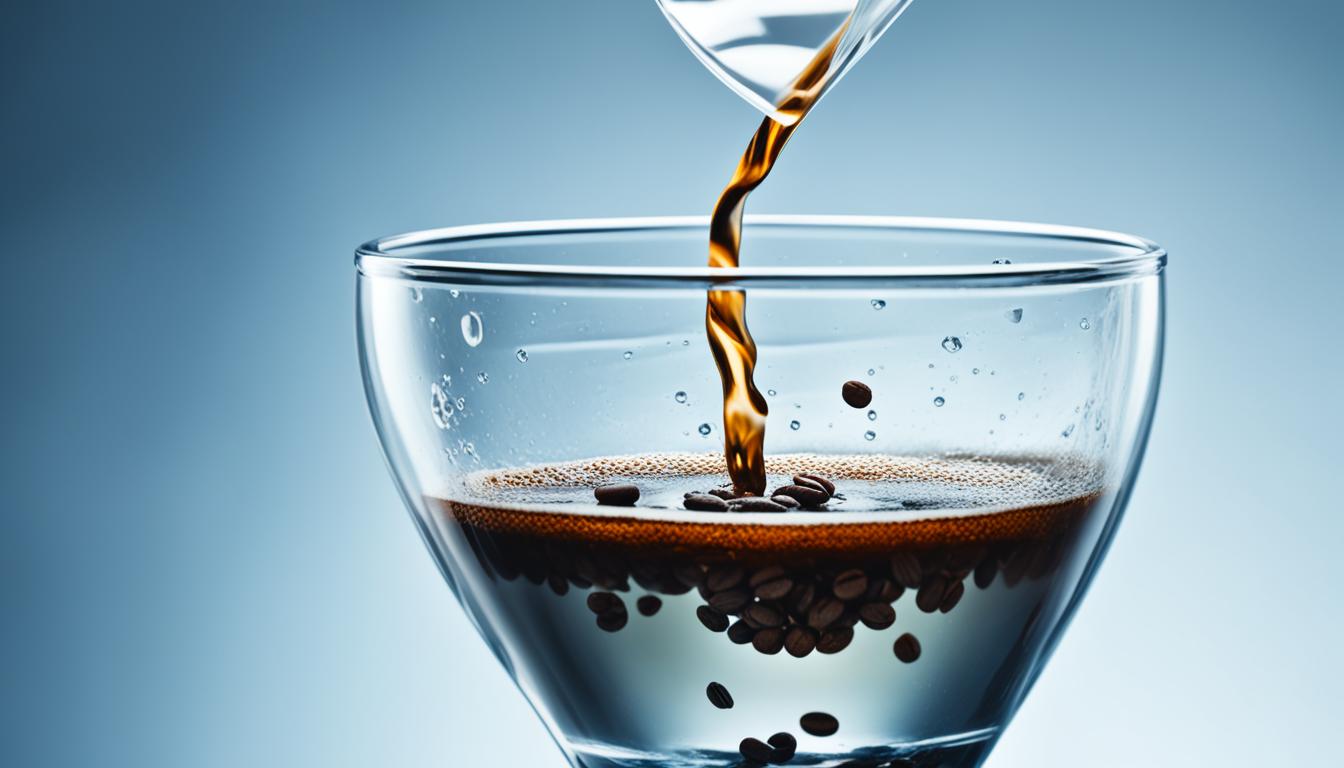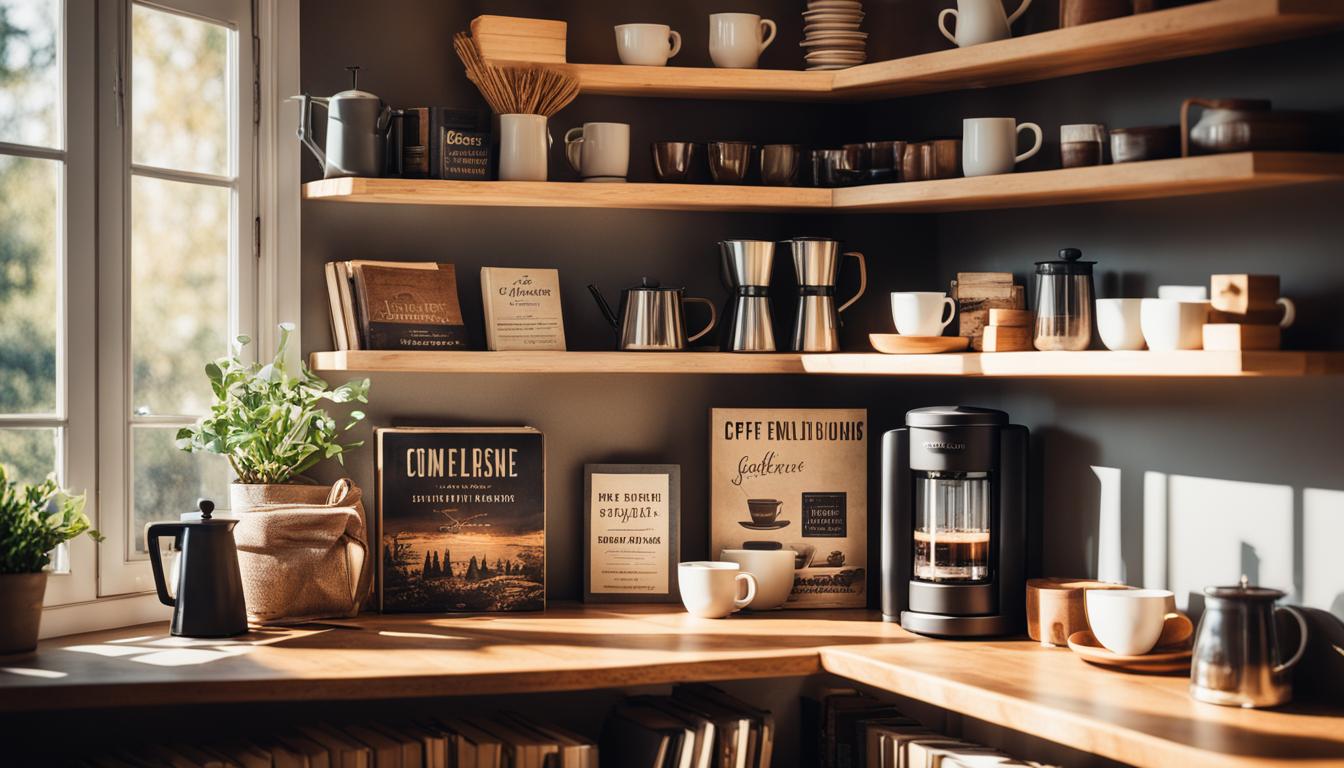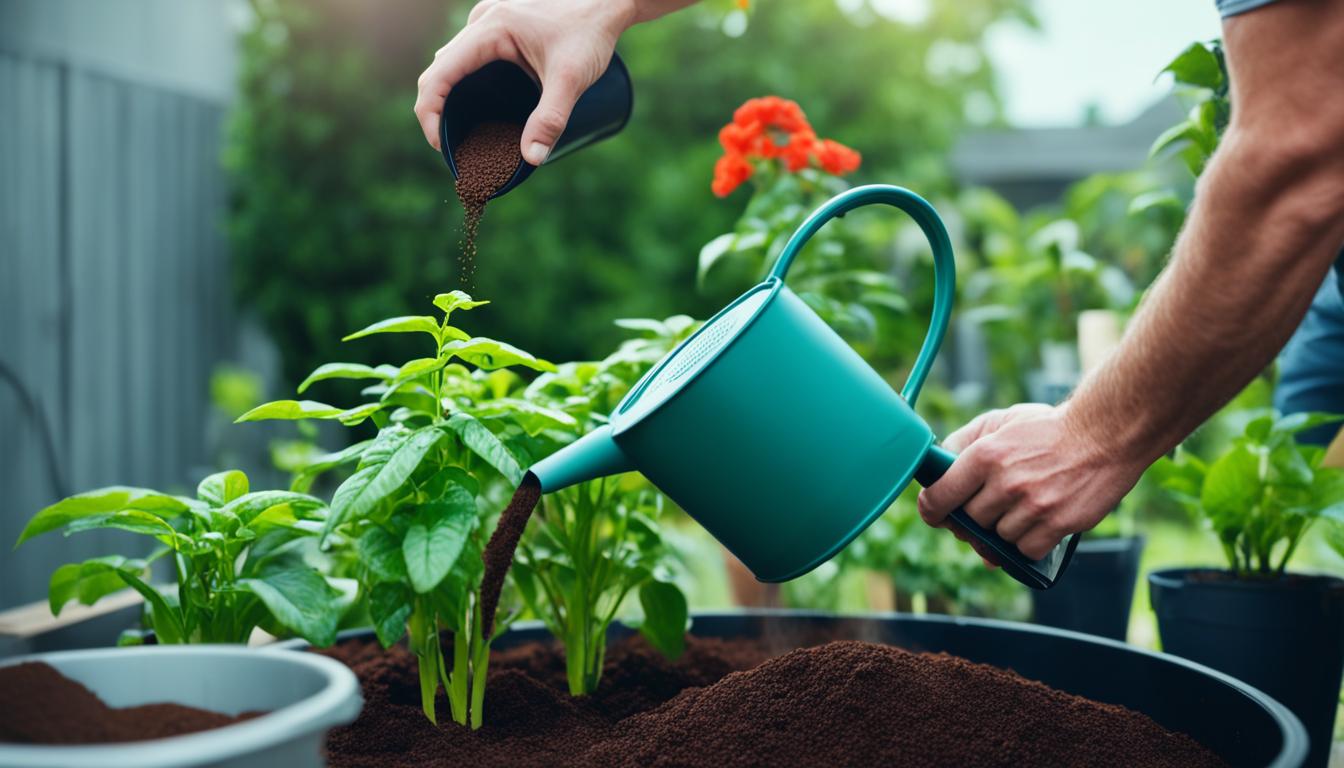Welcome to our guide on achieving the perfect cup of coffee! Many factors contribute to a great coffee experience, including the beans, the brewing method, and even the water you use. In this section, we will explore the crucial role of water quality when it comes to brewing a perfect cup of coffee. We will delve into why the water you use matters and how it can affect the taste and aroma of your brew. So, let’s dive in and discover why water quality is essential for perfect coffee.
Key Takeaways:
- The water you use for brewing coffee plays a significant role in the taste and aroma of the final cup.
- Water quality guidelines for coffee brewing are essential to ensure optimal extraction.
- Understanding the impact of water composition can help you identify and address any potential contaminants or minerals that may affect your coffee’s flavor.
- Improving coffee water quality involves adjusting water hardness, using filtration methods, and replicating industry standards.
- Choosing the best water for coffee brewing can elevate your coffee experience, enhancing flavors, acidity, and overall balance.
Understanding the Impact of Water Quality
When it comes to brewing the perfect cup of coffee, the quality of the water you use cannot be underestimated. The composition of water plays a vital role in the extraction process, influencing the taste, aroma, and overall quality of your brew. In this section, we will explore the importance of water quality and provide guidelines to ensure optimal brewing conditions.
Water Quality Guidelines for Coffee:
1. Contaminants: It is essential to be aware of the potential contaminants present in your water that can affect the flavor of your coffee. Common contaminants include chlorine, iron, and sediment. These impurities can lead to off-flavors and a bitter taste. Consider using a water filtration system to eliminate these contaminants and enhance the overall taste of your coffee.
2. Mineral Content: The mineral content in water also plays a significant role in the brewing process. Minerals such as calcium, magnesium, and bicarbonate help extract desirable flavors from the coffee grounds. However, excessive mineral content can result in an overly harsh taste. Striking the right balance is crucial for achieving a well-rounded and balanced cup of coffee.
Identifying and Addressing Water Quality Issues
To identify potential water quality issues, pay attention to the taste, aroma, and color of your brewed coffee. If you notice any off-flavors, such as a metallic or overly bitter taste, it may be an indication of poor water quality. In such cases, consider taking the following steps:
- Test Your Water: A water testing kit can help identify the specific contaminants present in your water source. This information will guide you in choosing the appropriate filtration system or treatment method.
- Invest in Filtration: Depending on the results of the water test, invest in a suitable water filtration system. This could be a simple pitcher filter, faucet-mounted filter, or an under-sink system, depending on your needs and budget.
- Consider Mineral Adjustments: If your water lacks the necessary minerals, you can add them in controlled amounts to improve extraction and enhance the flavors of your coffee. This process, known as mineral adjustment, can be done using mineral packets or specialty water enhancers.
Quote: Importance of Water Quality
“When it comes to brewing coffee, the quality of water can make or break the final result. Understanding the impact of water composition and taking necessary steps to improve its quality is crucial for achieving the perfect brew.”
In the next section, we will explore practical tips and techniques to help you achieve optimal water quality for brewing coffee at home. By understanding the significance of water composition and addressing any quality issues, you can unlock the true potential of your coffee beans and elevate your brewing experience to new heights.
Achieving Optimal Water Quality
When it comes to brewing the perfect cup of coffee, the quality of your water is just as important as the beans you use. To help you elevate your coffee game, we have gathered practical tips on how to improve the quality of your coffee brewing water.
Understanding Coffee Brewing Water Standards
In the coffee industry, specific standards are set for water used in the brewing process. These standards ensure consistency in taste and quality across different coffee establishments. By replicating these standards at home, you can enjoy a superior coffee brewing experience.
Table: Coffee Brewing Water Standards
| | Optimal Range |
|—————-|:————-:|
| pH Level | 6.5-7.5 |
| Total Dissolved Solids (TDS) | 150-200 ppm |
| Chloride Content | By ensuring your water falls within these ranges, you can achieve a balanced and flavorful cup of coffee.
Improving Water Quality for Coffee Brewing
There are several ways to improve the quality of your water for coffee brewing. Let’s explore some effective methods:
- Water Filtration: Invest in a high-quality water filtration system to remove impurities and contaminants. This will enhance the taste and clarity of your water.
- Adjusting Water Hardness: If your water is too hard or soft, it can affect the extraction process. Use water hardness test strips to determine the mineral content and adjust it accordingly.
- Mineral Content Adjustments: In some cases, you may need to add specific minerals to your water to reach the optimal ppm range. Consult brewing guides or professionals for precise measurements.
Remember, the goal is to create water that complements the natural flavors of your coffee beans without overpowering them.
“Achieving optimal water quality is the key to unlocking the true potential of your coffee beans.”
With these tips, you can create the perfect water for your coffee brewing needs. Experiment and adjust until you find the ideal balance that suits your taste preferences.

Elevate Your Coffee Experience
Elevate your coffee experience with our expert recommendations and techniques. We understand that achieving the perfect cup of coffee goes beyond selecting the finest beans and mastering the brewing process. The quality of the water you use plays a vital role in unlocking the full potential of your coffee.
By fine-tuning your brewing process using the optimal water quality, you can enhance the flavors, acidity, and overall balance of your coffee. The subtle differences that water can make in your brews are remarkable, and with the right knowledge, you can achieve consistent results every time.
Understanding the Impact of Water Quality
Water quality has a direct impact on the taste and aroma of your brewed coffee. The minerals present in the water interact with the coffee grounds, affecting the extraction process and flavor profile. It’s essential to understand the guidelines for water quality when brewing coffee to ensure the best possible outcome.
“Water is the most essential ingredient when it comes to making coffee. Its composition can profoundly influence the final product.”
Various contaminants and minerals can negatively impact the flavor of your coffee. Chlorine, for example, can result in an unpleasant aftertaste, while high levels of calcium and magnesium can lead to scale build-up in your equipment. Identifying these elements in your water and taking appropriate measures is crucial.
Achieving Optimal Water Quality
So how can you achieve the perfect water quality for your coffee? Let us guide you through the steps:
- Water Filtration: Invest in a high-quality water filtration system, such as activated carbon filters, to eliminate impurities that can affect the taste of your coffee. These filters can effectively remove chlorine, sediment, and other undesired elements.
- Water Hardness: Test the hardness of your water using a water hardness kit. Adjust the hardness level by diluting it with distilled or filtered water to create an optimal balance. The ideal hardness for brewing coffee falls within the 50-150 mg/L range.
- Mineral Content: Understand the ideal mineral content in brewing water. While minerals like calcium and magnesium are essential for extracting flavors from the coffee grounds, excessive amounts can cause issues. Aim for a TDS (total dissolved solids) level of 150-200 ppm to ensure optimal extraction.
By implementing these steps, you can replicate the water quality standards commonly used in the coffee industry, allowing you to brew exceptional coffee at home.
Remember, achieving the perfect cup of coffee is an art, and water quality is a critical ingredient. Experiment with different water sources, filtration methods, and adjustments to find your ideal brewing water. By elevating your coffee experience through perfect water quality, you can savor every sip and embark on a journey of exceptional flavors.
Conclusion
In conclusion, water quality is a crucial factor in achieving the perfect cup of coffee. We have explored the significance of water composition and how it can impact the taste and aroma of your brew. By understanding the importance of water composition, adhering to established guidelines, and implementing effective techniques, you can unlock the full potential of your coffee beans.
Experimenting with different water sources and treatment methods is key to finding your ideal brewing water. Whether it’s using filtered water, adjusting mineral content, or exploring other filtration methods, the journey to your perfect cup of coffee begins with understanding and optimizing water quality.
Elevate your morning ritual to new heights by embracing the importance of water in your coffee brewing process. Fine-tune your brewing techniques with the optimal water quality to enhance the flavors, acidity, and overall balance of your coffee. With a bit of experimentation and attention to detail, you can consistently enjoy a truly exceptional coffee experience.
So, go ahead and explore the world of water quality for coffee brewing. Unlock the hidden potential in every bean and make each cup a memorable one. Cheers to the perfect cup of coffee!
FAQ
Why does water quality matter when brewing coffee?
Water quality plays a crucial role in coffee brewing because it directly impacts the taste and aroma of the final cup. The minerals, contaminants, and pH level in water can greatly affect the extraction process and ultimately alter the flavors and quality of the coffee.
What are the guidelines for water quality in coffee brewing?
When it comes to water quality in coffee brewing, it is important to consider factors such as water composition, hardness, pH level, and contaminants. The Specialty Coffee Association (SCA) has established specific guidelines for optimum water quality, which include minerals within a certain range, balanced pH levels, and the absence of any undesirable tastes or odors.
How can I improve the quality of my coffee brewing water?
There are several ways to improve the quality of your coffee brewing water. One method is using a water filtration system that removes impurities and reduces mineral content. Additionally, adjusting the water hardness and mineral content to match the SCA guidelines can enhance the brewing process. Experimenting with different water sources, such as bottled or filtered water, can also make a difference.
What is the ideal water quality for brewing coffee?
The ideal water quality for brewing coffee is determined by the desired flavors and characteristics of the coffee beans. Generally, it is recommended to use water with a neutral pH level, balanced mineral content within SCA guidelines, and free from any undesirable tastes or odors. It is essential to find the water quality that complements the specific coffee beans you are using to achieve the best results.
How can water quality enhance my coffee experience?
By using optimal water quality, you can enhance the flavors, acidity, and overall balance of your coffee. Water with the right mineral content and pH level can extract the desired flavors from the coffee beans more effectively, resulting in a more enjoyable and satisfying cup of coffee. Consistently using high-quality water in your brewing process will enable you to consistently achieve excellent coffee.




